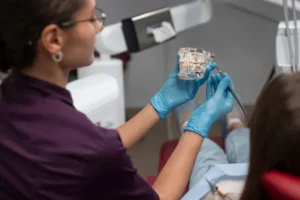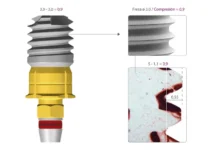Regular and proper maintenance of dentures is essential for their longevity and functionality. Denture repair, while sometimes inevitable, can often be minimized with the right care techniques. From cleaning your dentures daily to avoiding certain hard foods, there are several steps you can take to prevent damage. Additionally, understanding when to seek professional help for repairs is crucial to ensure your dentures stay in optimal condition. This article will explore practical tips for denture maintenance and the common signs that indicate a need for professional repair.
Why Timely Denture Repair is Essential
The importance of timely denture repair cannot be overstated. When dentures are damaged, they not only compromise the aesthetics of your smile but can also lead to significant oral health issues. Cracked or broken dentures can create sharp edges that irritate or injure the gums and soft tissues of the mouth. Furthermore, damaged dentures can make it difficult to chew food properly, potentially leading to digestive problems and nutritional deficiencies.
One of the most critical reasons for prompt denture repair is to maintain the proper functionality of your dentures. Ill-fitting or broken dentures can shift inside the mouth, leading to discomfort and further oral complications. Addressing these issues swiftly can prevent the development of sore spots, infections, and even bone loss. According to studies, patients who do not address denture issues in a timely manner are at a higher risk of experiencing increased bone resorption, which can complicate future denture fittings and adjustments.
Additionally, timely denture repair helps to protect the investment you’ve made in your dental health. Dentures are custom-made to fit your unique oral structure, and repairing them promptly helps to prolong their lifespan. Regular maintenance and quick fixes can prevent the need for more extensive and costly repairs down the line. In essence, taking care of even minor denture issues as they arise is a proactive approach to preserving your oral health and overall wellbeing. Interested in learning more? Check out our other articles on the importance of dental health and ways to maintain your perfect smile.
Common Denture Repair Issues
Dentures are essential for many individuals, offering both functional and aesthetic benefits. However, they are not immune to damage. Understanding the most common issues can help you better maintain your dentures and ensure they last longer.
Two of the most frequently encountered problems are cracks and fractures in the denture material, and loose teeth within the denture itself. Addressing these issues promptly and effectively can significantly improve your overall dental health and quality of life.
Below, we delve into these common denture repair issues in more detail, exploring their causes and potential solutions.
Cracks and Fractures
Cracks and fractures in dentures can occur for various reasons. One common cause is the accidental dropping of dentures onto hard surfaces. Another reason could be the natural wear and tear that results from daily use. Over time, the material can weaken, making it more susceptible to damage. Identifying a crack or fracture early is crucial. If left untreated, even a small crack can widen, ultimately leading to a complete break. Regular inspection of your dentures can help you spot these issues before they become severe.
Repairs for cracks and fractures usually involve bonding the broken pieces back together. In some cases, a partial replacement of the denture material may be necessary. Your dentist will assess the extent of the damage and recommend the most appropriate course of action.
Loose Teeth
Another common issue is loose teeth within the denture. This can occur due to various factors, such as the natural wear and tear of the denture base or the degradation of the adhesive material used to hold the teeth in place. Loose teeth not only compromise the functionality of the dentures but can also be uncomfortable and unsightly.
If you notice a tooth becoming loose, it’s essential to consult your dentist as soon as possible. Ignoring the problem can lead to further instability and even the loss of more teeth from the denture. Regular check-ups can help in catching such issues early.
Repairing loose teeth typically involves reattaching them with a stronger adhesive or even replacing the tooth if necessary. Advances in dental technology have made these repairs more effective and longer-lasting.
For more insights into keeping your dentures in top shape, we invite you to explore our other articles. By staying informed, you can ensure your dental health remains optimal.
DIY vs Professional Denture Repair
When it comes to denture repair, many individuals often find themselves questioning whether they should take matters into their own hands or seek professional help. The decision can be complicated by factors such as cost, time, and the extent of the damage.
Understanding the pros and cons of both DIY and professional denture repair is crucial for making an informed decision. While DIY solutions might offer immediate relief, they often lack the long-term benefits that professional services provide. Let’s delve into the specifics of each option to help you decide the best route for your situation.
Professional denture repair services offer not only expertise but also the use of specialized equipment and materials that are not available for home use. On the other hand, DIY methods might seem convenient and cost-effective, but they could potentially lead to further complications.
When to Opt for DIY Solutions
Choosing a DIY solution for denture repair can be tempting, especially when you’re in a pinch. However, this route should only be considered under specific circumstances. For minor issues, such as small cracks or slight misalignments, a DIY repair kit might suffice.
These kits usually contain materials such as adhesives and resin that can offer a temporary fix. They can be a good choice for short-term relief until you’re able to visit a professional. Here are some scenarios where DIY could be suitable:
- Minor Cracks: For small, superficial cracks that do not affect the overall stability of the denture.
- Slight Misalignments: When the denture is only slightly out of alignment but still functional.
- Emergency Situations: When you need an immediate fix and cannot reach a dentist right away.
However, one must exercise caution and follow the instructions precisely to avoid causing further damage. Overuse of adhesives or incorrect application can lead to more severe issues that would require professional intervention.
In summary, while DIY solutions can be a quick fix for minor problems, they are not a permanent solution. It is always advisable to follow up with a professional to ensure that the repair is robust and long-lasting. If you found this information helpful, be sure to check out our other articles for more tips on denture care and repair!
Common Questions on Denture Repair
Whether you’re a new denture wearer or have been using dentures for years, understanding the ins and outs of denture repair can help ensure your dental prosthetics last longer and function better. Here’s a commonly asked question with its answer.
What should I do if my denture breaks or cracks?
If your denture breaks or cracks, it’s important to handle the situation carefully. Avoid trying to repair it on your own as this can often lead to further damage. Instead, store the broken pieces in a safe place and contact your dentist as soon as possible. Most dental professionals can provide quick and effective repairs or will recommend a replacement if the damage is extensive. Remember, using damaged dentures can lead to discomfort or oral injuries, so it’s best to address the issue promptly.

My name is Salman Kapa, a 73-year-old expert in bone regeneration and dental implantology. With decades of experience in the field, I am dedicated to advancing our understanding of oral health and hygiene. Through my research and writing, I aim to contribute to the development of innovative solutions in dental care.




